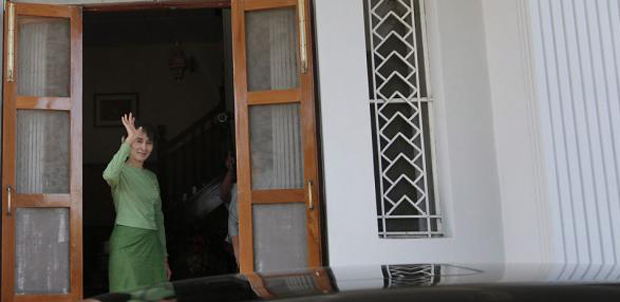If the reform efforts in Burma continue unabated, coupled with the visits of powerful foreign dignitaries, the once isolated nation could become a key player in the region.
Since August, the rapid turnaround has led to all sorts of scenarios and expectations about Burma's future in the regional scheme of things. As long as the leader of the National League for Democracy (NLD), Aung San Suu Kyi, stays engaged with the quasi-government of President Thein Sein, Burma's prospects for increased all-around international cooperation will continue. Ironically, for the time being, the flurry of diplomatic activity has been focused on Burma and its relations with the West.
At the Bali summit, Association of Southeast Asian Nations (Asean) leaders decided to support Burma's holding of the group's chair in 2014 in the hope that it would further reform. That decision has prompted Western leaders to visit and widen cooperation with Burma. The US has been the most assertive in forging ties and encouraging reforms there. The historic trip by US Secretary of State Hillary Clinton in November, and repeated visits by top US diplomats, is a barometer of Washington's high-risk diplomacy.
Burma's path to reform could still take an unexpected turn; nothing is written in stone at this juncture. In fact, the release of a few political prisoners last week showed that there could be some tensions between the military and civilian leaders. Even Suu Kyi voiced words of caution when she met with British Foreign Secretary William Hague about the ongoing transformations.
Strange as it may seem, enthusiasm among the West is far larger than within Asean in terms of visits and substance, as well as for providing further assistance both to Naypyidaw and Suu Kyi. For instance, since her release from house arrest in November 2010, Suu Kyi's guest list has been dominated by visitors from the West. Only a few Asean leaders have been included.
Last month, Thailand Prime Minister Yingluck Shinawatra became the first Asean leader to meet Suu Kyi in what was widely seen as a photo opportunity. Before that, she had spoken only to former prime minister Abhisit Vejjajiva, Philippine President Benigno Aquino and Indonesian President Susilo Bambang Yudhoyono. Indonesian Foreign Minister Marty Natalegawa called on her twice during Jakarta's Asean chairmanship. Her numerous interviews with the media, mainly Western, seldom mention Asean and Burma's integration within it, if at all. It is an open secret that she is still uneasy about discussing this topic. Indeed, she was not happy with Asean's decision to back the Burmese chair, as she believed it should have waited for more tangible reforms. She has yet to meet with Asean Secretary General Dr Surin Pitsuwan.
Her relations with Asean go back two decades to when she embarked on a democratic winding road without the grouping's support. Instead, Asean pursued its “constructive engagement” policy, which defended and tried to legitimize the oppressive Burmese military regime, eventually leading to its joining the group in 1997. After her release from her first six-year term of house arrest in July 1995, there was a fresh effort to mend fences through a scheduled meeting between her and Rangoon-based Asean ambassadors ahead of the Asean annual meeting in Brunei a week later.
However, Burma's strong opposition forced the cancellation of the planned rendezvous. A subsequent letter from her submitted directly to Asean foreign ministers remains unanswered even today. In reality, Asean leaders do not respond to such letters, despite all their goodwill toward her.
Throughout the subsequent years she was under repeated house arrest and her supporters abused, imprisoned and killed—not to mention the effort to halt overall democratic development in Burma. Only Western countries spoke out strongly and in some cases personalized her endeavors. They adopted tough measures including sanctions and took their cues from her. In her view, Asean has not fought for the Burmese people's rights.
To be fair, there were three occasions on which Asean found the collective courage to defend her and criticize the Burmese government as an undeserving family member of the grouping.
The first followed the brutal attack in Depayin at the end of May 2003, in which more than 100 of her party's members and supporters were killed. Asean took a common stand asking for her release after she was again placed in detention. Asean wanted some degree of guarantee that no further attacks would be made on her or her supporters.
The regime responded with a seven-point democratic road map. But overall, the Asean appeals fell on deaf ears. Asean-Burma ties almost reached breaking point between May and October 2003, when Asean leaders contemplated ways to reprimand Burma.

